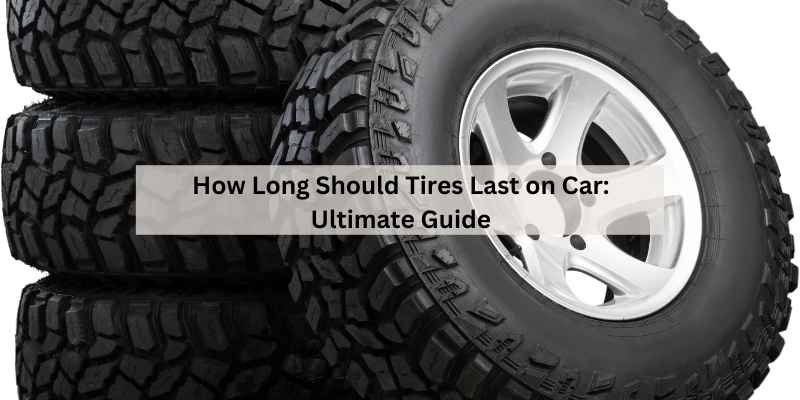How Long Should Tires Last on Car: Ultimate Guide
Car tires should last between 25,000 to 75,000 miles or 3 to 5 years with proper maintenance. Factors such as driving habits, road conditions, and regular maintenance can impact tire lifespan.
Your car’s tires are crucial for safety and performance, and understanding how long they should last is essential for maintenance. Generally, tires can last between 25,000 to 75,000 miles or 3 to 5 years. However, various factors such as driving habits, road conditions, and regular maintenance can impact the lifespan of your tires.
By adhering to proper maintenance and regularly inspecting your tires, you can ensure they last as long as possible, keeping you safe on the road while maximizing your investment.
Factors Influencing Tire Longevity
When it comes to the lifespan of your car tires, several factors come into play. Understanding these factors can help you maximize the longevity of your tires and ensure a safe and smooth driving experience. Let’s take a look at the key factors that influence tire longevity.
Driving Habits
Your driving habits play a significant role in determining how long your tires will last. Aggressive driving, such as hard braking, rapid acceleration, and excessive speeding, can cause excessive wear and tear on your tires. It’s important to drive responsibly and avoid sudden maneuvers to extend the lifespan of your tires.
Maintenance Routines
Regular maintenance routines are crucial for the longevity of your car tires. Proper tire inflation, alignment, and rotation are essential to ensure even tread wear and prolong tire life. Underinflated or overinflated tires can lead to uneven wear patterns and reduce tire longevity. Regularly checking and maintaining the correct tire pressure is key.
Additionally, regular tire rotations help distribute the wear evenly among all tires. This prevents uneven wear and extends the lifespan of your tires. It’s recommended to rotate your tires every 6,000 to 8,000 miles or as specified by your vehicle manufacturer.
Wheel alignment is another critical maintenance routine that affects tire longevity. Misaligned wheels can cause uneven tire wear and result in premature tire replacement. Regular wheel alignments, typically performed every 12,000 miles or as recommended by your vehicle manufacturer, help maintain proper tire alignment and extend tire life.
Other maintenance tasks, such as regular tire inspections for damage or punctures, should also be part of your routine. Identifying and fixing any issues promptly can prevent further damage and extend the lifespan of your tires.
By adopting good driving habits and following regular maintenance routines, you can significantly increase the lifespan of your car tires. Remember, proper tire care not only saves you money but also ensures your safety on the road.
Average Lifespan Of Tires
Tires are an essential component of any vehicle, ensuring safety, performance, and fuel efficiency. However, like any other part, tires have a limited lifespan and need to be replaced periodically. Understanding the average lifespan of tires is crucial for maintaining the overall health and functionality of your car.
By Mileage
One of the factors that determine the lifespan of tires is the number of miles driven. On average, tires can last anywhere between 25,000 to 50,000 miles. However, several variables can impact this range, such as driving habits, road conditions, and tire maintenance.
By following these guidelines, you can maximize the mileage you get out of your tires:
- Regularly check tire pressure and ensure it is within the manufacturer’s recommended range. Properly inflated tires can last longer and provide better fuel efficiency.
- Rotate your tires regularly. This helps distribute wear and tear evenly, extending their lifespan.
- Avoid aggressive driving habits, such as hard braking and accelerating, which can cause excessive wear on tires.
- Inspect your tires for signs of damage or uneven wear. If you notice any abnormalities, it’s crucial to address them promptly.
By Time
Another factor to consider when determining tire lifespan is time. Even if you haven’t reached the maximum mileage, tires should be replaced after a certain number of years. On average, tires should be replaced every six years, regardless of the mileage driven.
Time affects tires due to several factors, including exposure to sunlight, heat, and ozone. Over time, these elements can cause the rubber to deteriorate, making the tires more susceptible to blowouts and reduced performance.
To ensure your tires are safe and in optimal condition, it’s crucial to keep track of their age and replace them accordingly, even if they appear to have sufficient tread depth.
By understanding the average lifespan of tires and implementing proper maintenance practices, you can ensure the safety and longevity of your vehicle. Regular inspections, rotation, and replacement when necessary will not only enhance performance but also provide peace of mind on the road.
Signs Of Wear And When To Replace
Proper tire maintenance is essential for vehicle safety and performance. Understanding the signs of wear and knowing when to replace your tires can help prevent accidents and ensure a smooth driving experience. Keep an eye out for the following indicators to determine when it’s time to invest in new tires:
Tread Depth
One of the most critical aspects of tire wear is the tread depth. Insufficient tread depth can result in decreased traction, especially in wet or snowy conditions. To check the tread depth, use a tread depth gauge or the penny test. Insert a penny into the tread with Lincoln’s head facing down. If the top of Lincoln’s head is visible, it’s time to replace the tire.
Visible Damage
Inspect your tires regularly for visible damage such as cuts, bulges, or cracks. These issues can weaken the tire’s structure and lead to a blowout. If you notice any of these signs of damage, it’s crucial to replace the tire promptly to avoid safety hazards on the road.
Impact Of Environmental Conditions
The lifespan of car tires can vary depending on environmental conditions. Factors such as temperature, road conditions, and driving habits can impact how long tires last. It is recommended to monitor tire tread depth and replace tires every 3-5 years or when they reach a tread depth of 2/32 of an inch.
Temperature Effects
The temperature can significantly affect the lifespan of tires. Exposure to extreme heat or cold can lead to premature wear and degradation of the rubber compounds. High temperatures can cause the rubber to deteriorate faster, while cold temperatures can make the rubber more brittle, increasing the risk of cracking.
Road Conditions
The condition of the roads also plays a crucial role in determining the longevity of tires. Rough and uneven roads can accelerate tire wear and tear, leading to uneven tread wear and reduced lifespan. Additionally, potholes and debris on the roads can cause damage to the tires, impacting their overall durability.
In regions with extreme weather conditions, such as frequent temperature fluctuations and harsh road conditions, the lifespan of tires may be significantly reduced. It’s essential to consider these environmental factors when assessing the expected lifespan of car tires.
Choosing The Right Tires For Longer Life
Your car’s tires are an essential component that directly affects your vehicle’s performance, safety, and fuel efficiency. Tires are designed to last for a specific period, and choosing the right type of tire can significantly extend their lifespan. In this article, we will discuss the factors that determine tire life and how to choose the right tires for longer life.
Tire Types
The type of tire you choose has a significant impact on its lifespan. There are three main types of tires: all-season, summer, and winter. All-season tires are designed to perform well in a variety of weather conditions, including light snow. Summer tires are optimized for warm weather and provide better handling and traction on dry roads. Winter tires are designed to provide maximum grip on snow and ice.
Quality And Brand Considerations
The quality and brand of the tire also play a crucial role in determining its lifespan. High-quality tires from reputable brands are designed to last longer and provide better performance than cheap, low-quality tires. While high-quality tires may cost more upfront, they will save you money in the long run by lasting longer and requiring fewer replacements.
When choosing tires, it’s essential to consider the manufacturer’s warranty, which can provide valuable information about the tire’s expected lifespan and durability. Additionally, it’s important to consider the tire’s speed rating, load index, and treadwear rating, which can all impact its lifespan.
In Conclusion
Choosing the right tires for your car can significantly impact their lifespan. By selecting high-quality tires from reputable brands and considering the type of tire that best suits your driving conditions, you can ensure that your tires last as long as possible. Regular maintenance, including proper inflation, rotation, and alignment, can also help extend the life of your tires and keep you safe on the road.
Maintenance Tips For Extending Tire Life
To extend the life of your tires, follow these maintenance tips. Regularly check tire pressure, rotate tires every 5,000 to 8,000 miles, and keep tires properly aligned and balanced. Additionally, avoid overloading your vehicle and drive cautiously to minimize tire wear.
Regular Inspections
Regular inspections are crucial to extending the life of your car’s tires. Inspections should be done every month or before long trips to ensure the tires are in good condition and free from any damage. Look out for any cuts, punctures, bulges or cracks on the tires. If you notice any of these signs, it’s best to replace the tire immediately.
Proper Inflation
Proper inflation is another important factor in extending the life of your car’s tires. Tires that are overinflated or underinflated can cause uneven wear and tear on the tires, reducing their lifespan. Check your car’s manual for the recommended tire pressure and make sure to check the pressure regularly, at least once a month.
Tire Rotation
Regular tire rotation is also important to ensure even wear on all tires. The front tires wear out more quickly than the rear tires due to steering and braking. Rotating the tires every 5,000 to 7,500 miles will help extend the life of all four tires.
Alignment And Balancing
Proper alignment and balancing of the tires will also help extend their lifespan. Misaligned tires can cause uneven wear and tear, while unbalanced tires can cause vibrations and premature wear. Have your car’s alignment and balancing checked regularly to ensure the tires are wearing evenly.
Avoid Overloading
Avoid overloading your car with excess weight as this can cause the tires to wear out more quickly. Make sure to check your car’s weight limit and avoid carrying unnecessary heavy loads.
By following these maintenance tips, you can extend the lifespan of your car’s tires, saving you money in the long run. Regular inspections, proper inflation, tire rotation, alignment and balancing, and avoiding overloading are all important steps in maintaining the health of your tires.
Understanding Tire Warranties
Understanding tire warranties is essential for car owners to make informed decisions about tire maintenance and replacement. One crucial aspect of tire warranties is knowing the coverage limits and the process of claiming a warranty. Let’s delve into these topics in more detail.
Coverage Limits
When considering tire warranties, it’s important to understand the coverage limits provided by the manufacturer or the tire seller. This usually includes aspects such as tread wear, road hazard protection, and mileage guarantee. The coverage limits can vary between different tire brands and models, so it’s crucial to carefully review the warranty terms and conditions before making a purchase.
Claiming A Warranty
Claiming a tire warranty typically involves following specific procedures set by the manufacturer or the retailer. This may include providing proof of regular tire maintenance, such as rotation and alignment records. It’s important to adhere to the recommended maintenance schedule and keep detailed records to ensure a smooth warranty claim process. Additionally, understanding the timeframe within which a warranty claim can be made is crucial to maximizing the benefits of the coverage.
Myths Vs. Facts On Tire Longevity
When it comes to the longevity of car tires, there are several myths and misconceptions that can lead to confusion. Let’s uncover the truth by exploring the myths and facts surrounding tire longevity.
Common Misconceptions
1. Tire Life Expectancy: Many people believe that tires should last for a specific number of years, regardless of usage. This is not entirely accurate as tire longevity is influenced by various factors.
2. Mileage Guarantee: It’s a common misconception that all tires come with a specific mileage guarantee. While some tires do offer mileage warranties, they are not applicable to all tires.
Truths Unveiled
1. Usage Patterns: The lifespan of tires can vary based on usage patterns, driving habits, road conditions, and maintenance practices.
2. Tire Maintenance: Regular tire maintenance, such as proper inflation, alignment, and rotation, significantly impacts the longevity of tires.
Frequently Asked Questions
How Many Miles Do Normal Tires Last?
On average, normal tires last for about 50,000 miles. However, this can vary depending on factors like driving habits, road conditions, and the type of tire. It’s important to check your tires regularly for wear and tear, and consider replacing them if they are more than six years old, regardless of mileage.
How Often Should Car Tires Be Replaced?
Car tires should be replaced about every six years.
How Often Should Car Tyres Be Changed?
Car tires should generally be changed every 3 to 5 years, or every 40,000 to 60,000 miles, to ensure optimal safety and performance.
How Long Do Dealership Tires Last?
Dealership tires typically last between three to five years, depending on usage and maintenance. Regular inspections and proper care can extend their lifespan.
Conclusion
The lifespan of car tires can vary depending on various factors such as driving habits, road conditions, and tire maintenance. On average, tires can last between three to five years, or around 40,000 to 60,000 miles. However, it is important to regularly inspect and monitor the condition of your tires to ensure optimal performance and safety.
By following proper tire maintenance and considering these guidelines, you can maximize the lifespan of your tires and enjoy a safe and comfortable driving experience.







